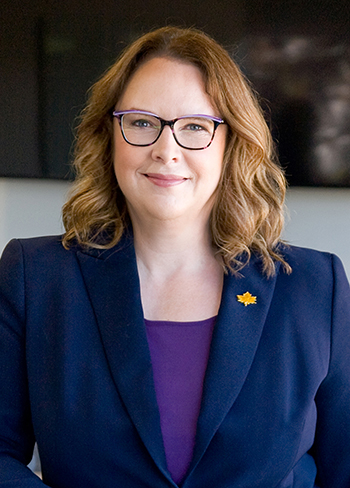After more than a year of teaching, learning, working and conducting research in a predominantly virtual environment, we were thrilled at Laurier to welcome some of our students, faculty and staff back to our campuses this fall.
This careful transition to more in-person activities prioritized the health and safety of our community and required significant thought and planning over the spring and summer months. I am grateful to Laurier’s staff, full-time and contract-teaching faculty whose dedicated efforts ensured our successful return to our campuses. I am happy to report that as of printing time we are tracking to resume full capacity classrooms and offices for winter term, with strong health and safety measures in place.
We are looking to the future with cautious optimism as we envision a post-pandemic world as COVID becomes endemic and health measures such as vaccinations, masks and rapid testing protect us from spread and severe illness. Laurier certainly has a role to play in pandemic recovery. Even before the pandemic, universities were considering the many ways to meet the increasing demand for continuing education and skills training. Now, with more people looking to reskill and enter new careers, Laurier is in a position to support our communities in economic and social recovery.

Laurier President and Vice-Chancellor Deborah MacLatchy
Already, we have launched a number of smaller credential offerings for mid-career workers. In 2020-2021, Laurier saw an increase of 37% in enrolment in the continuing education programs we offer and the university created 26 new programs ranging from boot camps to full courses and micro-credentials. These programs benefit from our faculty expertise and offer an opportunity to develop the enduring skills typically acquired at universities, but in shorter, more accessible formats.
For professionals looking to fill knowledge gaps in technology shifts, the Digital Literacy and Emerging Technology certificate offers introductory courses in bitcoin and blockchain, cybercrime and biometrics, to name a few. For professionals in the legal, social and public safety sectors, Laurier has launched a series of courses called the Gladue Principles: Indigenous Peoples and the Canadian Criminal Justice System. These courses provide historical context of Indigenous law and the inter-generational impact of colonization and meet the need for more education around truth and reconciliation with Indigenous peoples.
In the spring, Laurier wrapped a pilot project with Waterloo Region’s Communitech in which 40 mid-career employees in Waterloo Region expanded their skills in communications and sales through a combination of three-week sprint learning modules at Communitech Academy and two six-week immersive courses taught by Laurier faculty.
These are just a few examples of the innovative programming being developed at Laurier to meet the needs of learners at all life stages. I am excited by the spirit Laurier’s faculty and staff have brought to imagining the different ways university-level education may be acquired. The pandemic has presented many challenges for universities, yet the recovery holds promise and possibilities for ways that we can support a growing and diverse body of learners and reach those in need of skills and knowledge development.
Making this new world of work and learning as equitable as possible is a priority for Laurier. I am looking forward to collaborating with government, communities, industry and our alumni to build this brighter future.
Deborah MacLatchy
President and Vice-Chancellor
Wilfrid Laurier University